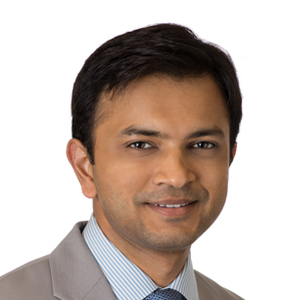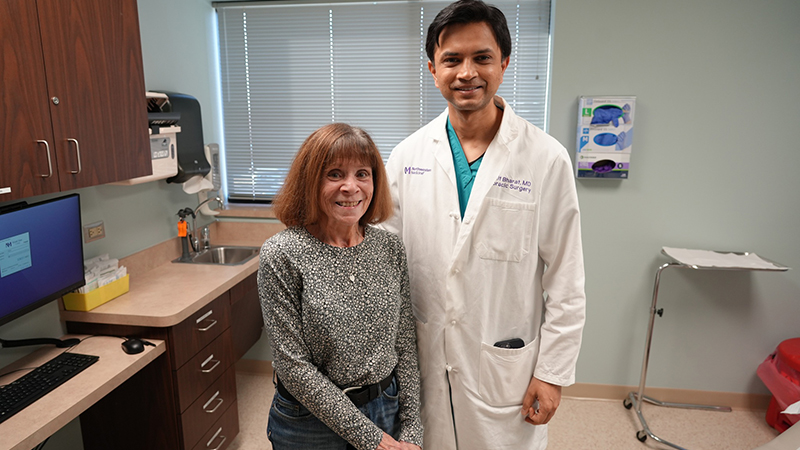Lung Transplant for Advanced Lung Cancer
Breakthrough Clinical Program for People with Stage 4 Lung Cancer
Published September 2022
On September 25, 2021, at the age of 54, Albert Khoury from Chicago became the first patient with stage 4 lung cancer to receive a lung transplant at Northwestern Medicine. Albert, a cement finisher, was diagnosed with stage 4 lung cancer and ended up in the intensive care unit on a ventilator when chemotherapy treatments failed. Because his tumor completely encased both lungs and hadn’t spread to other parts of his body, he was a candidate for a double-lung transplant for lung cancer.
Northwestern Medicine is the place to be.— Tannaz Ameli
Lung cancer is the third most common cancer in the U.S. It’s also the leading cause of cancer-related deaths in the nation among men and women*, making up almost 25% of all cancer mortalities. More people die of lung cancer in the U.S. than of colon, breast and prostate cancers combined.
Lung cancer is considered stage 4 when it has spread to another area of the lungs, the fluid surrounding the heart or the lungs, or other parts of the body.
Stage 4 lung cancer:
- Does not respond well to standard cancer treatments like chemotherapy and radiation therapy
- Can’t be cured from a patient’s lungs
- Is considered a “life-limiting illness”
“These are patients diagnosed with some forms of lung cancer that have spread within the lung, are out of treatment options and have limited time to live,” says Ankit Bharat, MD, chief of Thoracic Surgery at Northwestern Medicine Canning Thoracic Institute.
Innovative Treatment for Advanced Lung Cancer
A new clinical program at Northwestern Medicine is offering an innovative alternative treatment for select patients with stage 4 lung cancer: Lung transplantation.
“In this unique program we will include select patients with some forms of lung cancer that are limited to the lungs for the consideration of double-lung transplant if conventional treatments have failed,” says Dr. Bharat.
The outcomes of the program’s first 75 patients will also be tracked in a new research registry called Double Lung Transplant Registry Aimed for Lung-limited Malignancies (DREAM), which was recently listed on clinicaltrials.gov.
“Encouraged by our first two patients, the goal of following these registry participants is to maintain close follow-up care by our multidisciplinary team and demonstrate good outcomes while learning new insights about lung cancer,” says Young Chae, MD, a Northwestern Medicine medical oncologist.
How Lung Transplant for Lung Cancer Works
Using a technique similar to what they pioneered to transplant lungs destroyed by COVID-19, Northwestern Medicine surgeons start by removing the diseased lungs and clearing any remaining cancer cells from the airways before transplanting the new lungs.
“This innovative technique involves putting the patient on full heart and lung bypass, delicately taking both cancer-ridden lungs out at the same time along with the lymph nodes, washing the airways and the chest cavity to clear the cancer, and then putting new lungs in,” says Dr. Bharat. “These patients can have billions of cancer cells in the lungs, so we must be extremely meticulous to not let a single cell spill into the patient’s chest cavity or blood stream. We believe this technique can help reduce the risk of recurrence, which we learned through our experience with pioneering COVID-19 lung transplants.”
Patient Success Stories
As of March 2023, Northwestern Medicine surgeons successfully performed double-lung transplants for two patients with stage 4 lung cancer and are currently evaluating more for the DREAM program.
Albert’s Story
More than a year after receiving the lifesaving surgery, Albert still has no signs of cancer left in his body and has returned to work.
“My life went from zero to 100 because of Northwestern Medicine,” says Albert. “You didn’t see this smile on my face for over a year, but now I can’t stop smiling. My medical team never gave up on me.”

Tannaz’s Story
As Albert was receiving his transplant in September 2021, Tannaz Ameli of Minneapolis, Minnesota, was struggling with a lingering cough. By January 2022, the retired nurse went to a large health system in Minnesota where they confirmed she had stage 4 lung cancer. When chemotherapy treatments didn’t help, Tannaz’s husband reached out to the Northwestern Medicine Canning Thoracic Institute Second Opinion Program. Because Tannaz’s cancer was confined to the lungs and hadn’t spread to other parts of the body, the 64-year-old was listed for a transplant and received new lungs within 10 days on July 13, 2022.
“I begged my doctors in Minnesota to consider a lung transplant, but they wouldn’t do it. Luckily, my husband refused to give up and pushed for a second opinion,” says Tannaz. “When I came to Northwestern Medicine, the first thing Dr. Bharat told me was, ‘I think we can make you cancer-free,’ and he delivered on those words. If you or your loved one has lung cancer, Northwestern Medicine is the place to be. Everyone is amazing, and I can’t thank them enough for saving my life.”
.jpeg?h=756&w=1008&hash=24B4D3032D931867A20180AB8860B3FA)
Dreams Come True
To learn more about the DREAM registry qualifications, visit the clinicaltrials.gov webpage. If you’re interested in being evaluated for transplant, please call the referral line at 312.695.5864. To be considered as a candidate, the lung cancer must be confined to the lungs with no spread to other parts of the body.
*Scientists do not always collect information from participants about gender identity. To avoid misrepresenting the results of this research, we use the same terminology as the study authors.







